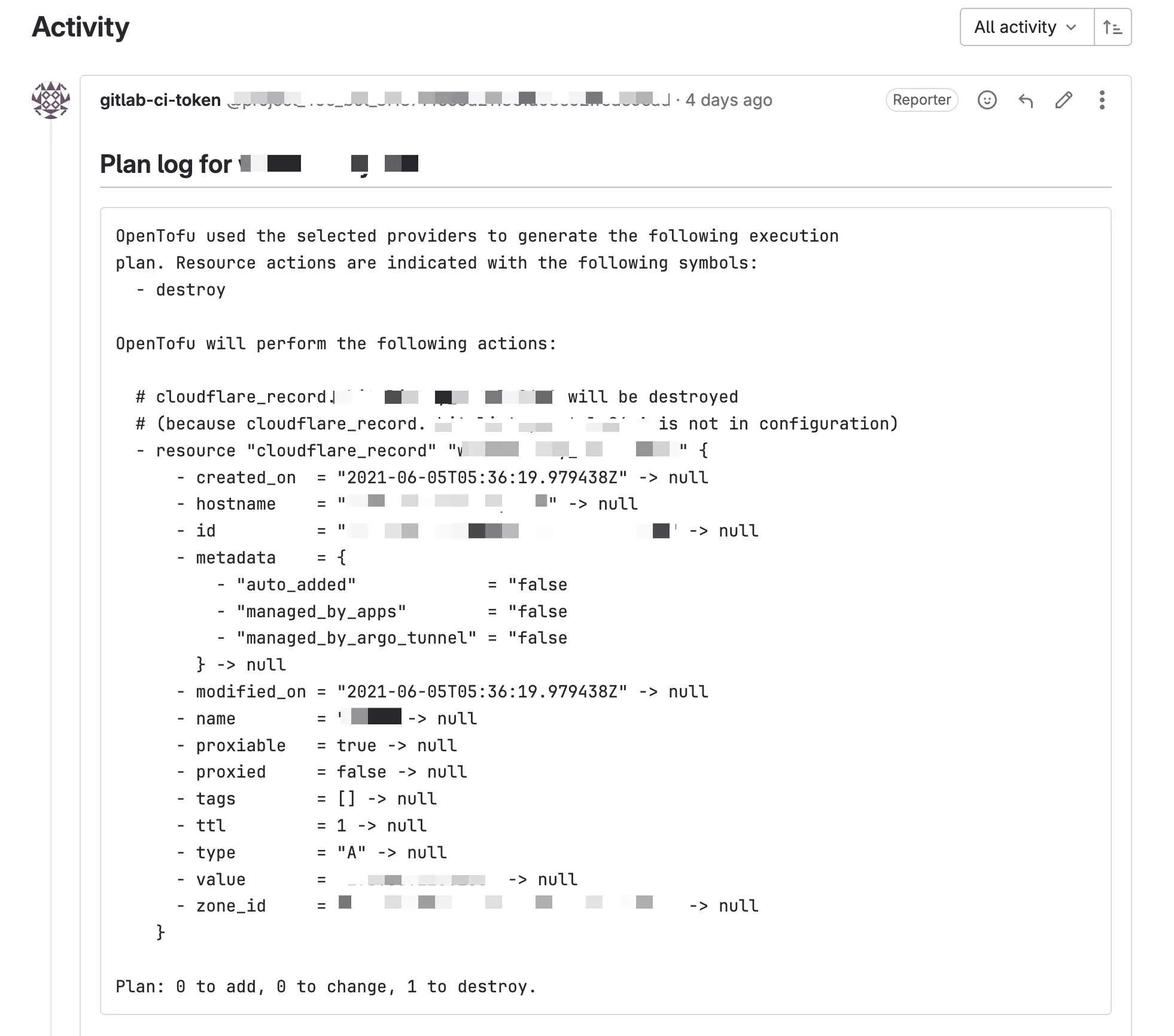Automating DNS Management with GitLab CI/CD
At End Point, managing DNS records across multiple domains has historically been a manual task. This blog post details our journey from manual processes to an automated workflow using GitLab CI/CD.
Our Initial Approach
With multiple domains and frequent updates necessary to manage the servers, manual handling of DNS changes became a bottleneck. Initially, our process looked like this:
- Make changes to the OpenTofu configuration files
- Create a merge request (MR) in GitLab
- They would run
tofu planmanually and paste the plan output into the MR for review - A coworker would review the MR and approve the changes
- Once merged, the engineer would manually run
tofu applyto implement the changes
While this process worked, automating it could enhance our productivity and minimize errors, integrating our DNS management directly into our CI/CD pipeline.
The Solution: Automating with GitLab CI/CD
- Change Submission: Engineers make changes to the OpenTofu files and submit a merge request
- Plan Creation: A GitLab CI/CD job automatically generates an OpenTofu plan when changes are proposed
- Review Process: A coworker reviews the automatically generated plan in the MR
- Applying Changes: Once approved and merged, another CI/CD job automatically runs
tofu applyto implement the changes
Implementation Details:
1. .gitlab-ci.yaml
If you are doing this on a self-hosted GitLab instance you would need to import the repo to your hosted GitLab workspace and use it there.
We divided our GitLab CI/CD pipelines into three main stages:
- Validation: Where we check if everything looks right
- Planning: Where we create a plan to show the changes
- Deployment: Where the changes get applied once everything is approved
It’s important to note that our CI/CD pipeline runs on a dedicated worker. This means only this worker has access to the secret keys needed for DNS management. By isolating these credentials to a single, controlled environment, we significantly reduce the risk of unauthorized access or accidental exposure of sensitive data.
include:
- component: gitlab.com/components/opentofu/job-templates@main
inputs:
version: 0.24.0
opentofu_version: 1.6.2
auto_apply: false
before_script:
- source /home/gitlab-runner/.tofu.env
stages: [ validate, build, deploy]
fmt-example.com:
extends: [ .opentofu:fmt ]
variables:
TF_ROOT: "example.com"
TF_STATE_NAME: "example_com"
rules:
- if: '$CI_PIPELINE_SOURCE == "merge_request_event"'
changes:
- example.com/*
- if: '$CI_COMMIT_BRANCH == "main"'
changes:
- example.com/*
validate-example.com:
extends: [ .opentofu:validate ]
variables:
TF_ROOT: "example.com"
TF_STATE_NAME: "example_com"
rules:
- if: '$CI_PIPELINE_SOURCE == "merge_request_event"'
changes:
- example.com/*
- if: '$CI_COMMIT_BRANCH == "main"'
changes:
- example.com/*
plan-example.com:
extends: [ .opentofu:plan ]
variables:
TF_ROOT: "example.com"
TF_STATE_NAME: "example_com"
rules:
- if: '$CI_PIPELINE_SOURCE == "merge_request_event"'
changes:
- example.com/*
- if: '$CI_COMMIT_BRANCH == "main"'
changes:
- example.com/*
after_script:
- source /home/gitlab-runner/.tofu.env
- ./gitlab-comment-tofu-log.sh $TF_ROOT/plan_output.txt
apply-example.com:
extends: [ .opentofu:apply ]
variables:
TF_ROOT: "example.com"
TF_STATE_NAME: "example_com"
rules:
- if: '$CI_COMMIT_BRANCH == "main"'
changes:
- example.com/*
after_script:
- source /home/gitlab-runner/.tofu.env
- ./gitlab-comment-tofu-log.sh $TF_ROOT/apply_output.txt2. Posting OpenTofu plan/apply logs as merge request comments
To facilitate code reviews, we created a script (gitlab-comment-tofu-log.sh) that automatically formats and posts the OpenTofu plan and apply logs as comments on merge requests. This ensures that reviewers can easily understand the changes before approving them.
Here is the script:
#!/bin/bash
set -e
echo "GitLab MR Comment Script Starts"
if [ $# -eq 0 ]; then
echo "Error: No output file path provided"
echo "Usage: $0 <path_to_output_file>"
exit 1
fi
output_file="$1"
echo "Using output file: $output_file"
echo "Checking environment variables"
if [ -z "$GITLAB_API_TOKEN" ]; then
echo "Error: GITLAB_API_TOKEN is not set"
exit 1
fi
if [ -z "$CI_PROJECT_ID" ]; then
echo "Error: CI_PROJECT_ID is not set"
exit 1
fi
if [ -n "$CI_MERGE_REQUEST_IID" ]; then
echo "Using CI_MERGE_REQUEST_IID: $CI_MERGE_REQUEST_IID"
else
echo "CI_MERGE_REQUEST_IID not set, fetching from API"
CURRENT_COMMIT_SHA=$(git rev-parse HEAD)
echo "Current commit SHA: $CURRENT_COMMIT_SHA"
MR_INFO=$(curl --silent --header "PRIVATE-TOKEN: $GITLAB_API_TOKEN" \
"https://<link_to_self_hosted_gitlab>/api/v4/projects/$CI_PROJECT_ID/repository/commits/$CURRENT_COMMIT_SHA/merge_requests")
if [ "$(echo $MR_INFO | jq '. | length')" -eq 0 ]; then
echo "Error: No merge request found for this commit" >&2
exit 1
fi
CI_MERGE_REQUEST_IID=$(echo $MR_INFO | jq '.[0].iid')
echo "Found Merge Request IID: $CI_MERGE_REQUEST_IID"
fi
echo "Reading output file: $output_file"
if [ ! -f "$output_file" ]; then
echo "Error: File $output_file not found"
exit 1
fi
file_name=$(basename "$output_file")
if [[ "$file_name" == plan_* ]]; then
heading="<br>Plan log for $TF_ROOT"
output=$(awk '/OpenTofu used the selected providers/,0' "$output_file")
elif [[ "$file_name" == apply_* ]]; then
heading="<br>Apply log for $TF_ROOT"
output=$(awk '/OpenTofu has been successfully initialized/,0' "$output_file")
else
heading="<br>Tofu Output for $TF_ROOT"
fi
echo "Filtered output read. Length: ${#output} characters"
echo "Cleaning and formatting output"
cleaned_output=$(echo -e "$output" | sed -e 's/\x1b\[[0-9;]*m//g' \
-e 's/\\u001b\[[0-9;]*m//g' \
-e 's/\\n/\n/g' \
-e 's/\\"//g' \
-e 's/^"//g' \
-e 's/"$//g')
echo "Cleaned output. Length: ${#cleaned_output} characters"
# Format the output with heading and code block
formatted_output="$(printf '## %s\n\n```\n%s\n```' "$heading" "$cleaned_output")"
echo "Formatted output. Length: ${#formatted_output} characters"
echo "Posting comment to GitLab MR"
response=$(curl --silent --show-error --fail \
--request POST \
--header "PRIVATE-TOKEN: $GITLAB_API_TOKEN" \
--header "Content-Type: application/json" \
--data "$(jq -n --arg body "$formatted_output" '{"body": $body}')" \
"https://code.self_hosted_gitlab.com/api/v4/projects/$CI_PROJECT_ID/merge_requests/$CI_MERGE_REQUEST_IID/notes")
if [ $? -eq 0 ]; then
echo "Comment successfully posted to GitLab MR"
else
echo "Error: Failed to post comment to GitLab MR. Response: $response"
exit 1
fi
echo "Script completed successfully"Here is the tofu plan output comment:

Here is the tofu apply output comment:

3. Migrating to GitLab’s Remote HTTP Backend
Transitioning your local Tofu state to a remote backend hosted by GitLab can streamline state management and enhance security. Follow these straightforward steps to achieve this.
-
First, set up the necessary environment variables with your specific details:
export TF_STATE_NAME="example_net" export TF_HTTP_ADDRESS="https://<link_to_GitLab_instance>>/api/v4/projects/460/terraform/state/$TF_STATE_NAME" export TF_HTTP_USERNAME="<create_a_user>" export TF_HTTP_PASSWORD="<create_a_password>" -
Initialize the remote backend with Tofu, specifying your new backend configuration:
tofu init -migrate-state \ -backend-config="address=$TF_HTTP_ADDRESS" \ -backend-config="username=$TF_HTTP_USERNAME" \ -backend-config="password=$TF_HTTP_PASSWORD" -
Verify the migration by running:
tofu plan
After these steps, your Tofu environment will be fully integrated with GitLab’s remote HTTP backend, with state management and enhanced collaboration and security.
Automation of our DNS management with GitLab CI/CD and OpenTofu has transformed our operations, making them more efficient, error-resistant, and secure. We encourage other teams to explore similar automation strategies to enhance their infrastructure management processes.


Comments